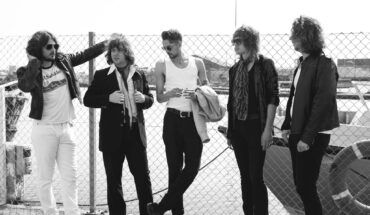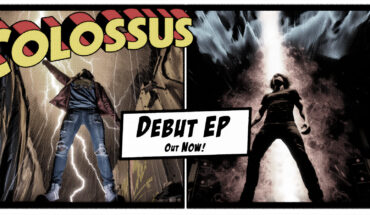Describing themselves as “violent pop for the patronised”, Scottish band ULTRAS are the brainchild of multi-instrumentalist Gav Prentice. Having previously garnered support from the likes of Steve Lamacq and Gideon Coe on BBC 6 Music, and have wowed crowds supporting We Were Promised Jetpacks and Admiral Fallow, they have just released their debut album.
We caught up with with Gav to find out more…
Hello Ultras, please introduce yourself!
Hiya! My name is Gav Prentice, ULTRAS started as a name for the music I was making on my own with a bunch of different producers, but it’s also a live band with a shifting line up which is mostly me, the drummer Roy Mohan Shearer, and the guitarist Matt Clark. I hope that’s clear…
The word ‘ultras’ is often associated with football hooligans. How did the name come about and why?
Well, strictly speaking ultras aren’t hooligans. You get old school ‘casuals’ – guys who would follow football teams wearing no colours so they could evade the police and organise fights, then the opposite of that would be these big colourful displays put on by people who call themselves ultras nowadays. A lot of what that movement is about is solidarity across the support of teams, countries, races. Even in the city I live in, with the famously bitter Celtic/Rangers divide, I found these odd little bits of evidence of solidarity between the ultras in opposition to the police and the Scottish government’s anti-sectarian legislation.
Of course the various ultras movements can still spill into trouble, and what appealed to me about the name was that is seemed to just sum up the fanatical element of this really broad working class movement which could be really positive and negative at the same time. There’s no coherent ideology in there. Some of the most moving demonstrations of pro-refugee, anti-fascist solidarity have come from ultras across Europe, then some of them have this disgusting far right element. It seemed to sum up to me this working class anger and solidarity that can get directed at anything and be destructive or constructive depending on the direction of the wind. So it fitted the bunch of songs that I’d started writing which had no real ideology to them, that were just these explorations of my feelings around violence and aggression and patriotism and all these negative social forces which we’re confronted with now.
But it’s worth stressing the word ‘ultras’ is badly misused in the media. Some of the Russian and English fans causing trouble at the last European Championships for example were hooligans in a very old fashioned sense and not recognisably ultras at all, despite what the press were saying – they wouldn’t call themselves that and the real ultras wouldn’t consider them comrades either.
Can you describe your sound in 3 words?
Violent but euphoric.
What’s the story behind your self-titled album release?
There are six producers and nine musicians across twelve tracks, all people based in Scotland that I’d either worked with before or had intended to for a long time – namely Jonnie Common, Joe Cormack, Julian ‘Miaoux Miaoux’ Corrie, Paul ‘Gal’ Gallagher, Ben Hillman, and I produced a track myself.
How did the concept of working with numerous producers come about?
It’s inspired by the way that hip-hop mixtapes get put together. A ‘producer’ in hip-hop is really the person making all of the music for the rapper to then rap on top of, whereas in rock the producer is essentially in charge of the recording process for the band. So you tend to get much more musically diverse ‘albums’ in hip-hop thanks to there being numerous people chucking stuff in. So the producers on my album are all making beats and playing synths and are generally much more involved in the arrangements of the songs. I just thought that was really interesting and far more exciting than your straight up bass/drums/guitars/vocals thing, which to be honest, even although you could still certainly call this rock music and that’s what I’ve grown up with and feel most comfortable doing, I have tended to pull away from when I can.
How did working with so many different people form different backgrounds affect your songwriting?
The songwriting was the one thing that was unaffected really, despite all that we were doing with the arrangements and production the core of the songs themselves remained. The concept of these songs about violence, with these characters who are trying to seize control of their lives in one way or another, was already fully formed. I think if I didn’t go in with that kind of certainty at the beginning it would have become a bit of a mess.
Where do you think your sound fits in contemporary music?
I have absolutely no idea. It would feel a bit wrong to try and second guess that. I know that there are people out there who try to write music to fit an idea of how they think it’ll go in the marketplace, I’ve met some of these people, and honestly I find that reprehensible. It’s such a gamble, every time you bring something out you’re rolling the dice to see if people will like it, but the only consolation or security you can cling to is that you’ve made something honest that has integrity. If you don’t even have that then I don’t know what you’re playing at! People like that should get into finance or something instead.
Who would you say are three of your most influential artists past or present?
I’m a big Bruce Springsteen fan, I think he sets the bar for everyone as a songwriter – to have had a career so long and constantly write this relevant and vital stuff is mindblowing.
Kendrick Lamar was probably the biggest single influence on the ULTRAS album, particularly To Pimp a Butterfly. The way he used producers and musicians from LA that were all quite different but actually all working towards integrating jazz into hip-hop in a really fluid way, and the way that he still had such a strong central idea for a narrative for the album so it still all held together, that was a big inspiration in getting across what I wanted to do with this album. When looking at mixing and mastering we were actually reading about how he went about that process on To Pimp a Butterfly to get it right. I actually think he might be my favourite rapper of all time now, seriously.
This sounds incredibly obvious but The Beatles are probably my favourite band of all time. I’m saying all this stuff about hip-hop production but some of the techniques they got into in their latter albums were starting to go there already in the ’60s. The mesh of different sounds on the white album, the way that it sounds as if it’s four or five records mashed together, I’ve always thought that’s what an album should be like, as ambitious as you can be.
What does the rest of 2017 have in store for the band?
We’re going to get out and play live to support this record – we’ve got album launch dates in the diary (check here for those: http://ULTRASband.com ) and will be out again before too long. The band’s really come together over the past year as a distinct thing to the album and we feel strong as a unit now. I’m also in the early stages of writing a play, which I’ve been getting supported for by National Theatre of Scotland. Also, I’m getting married this year. I’m sure I can pull this all off in the same year without having a breakdown…
Huge thanks to ULTRAS for answering our questions!
Ultras, the eponymous debut album, is out now via Hello Thor Records and Instinctive Racoon.






